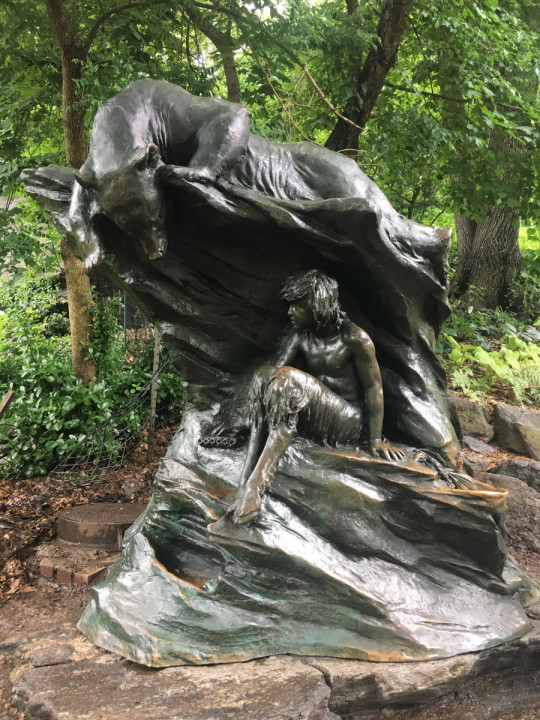#Morningside Park
Text
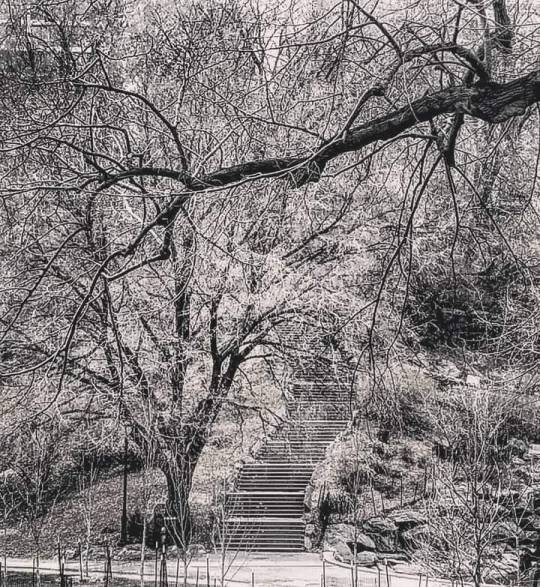
A stairway amidst the trees in #Morningside_Park, #Manhattan.
12 notes
·
View notes
Text
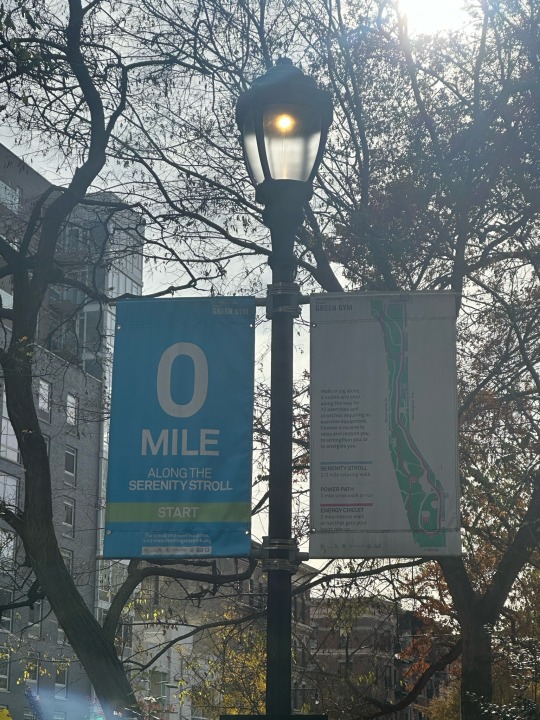
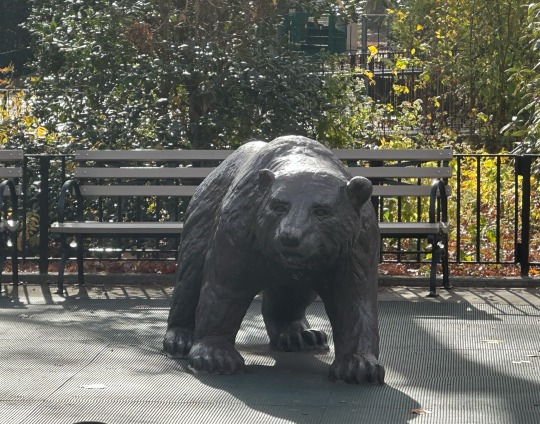
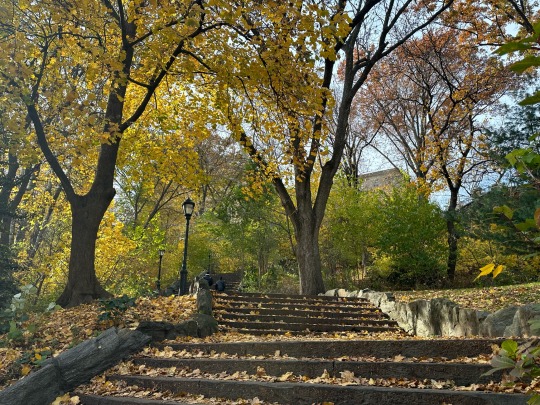
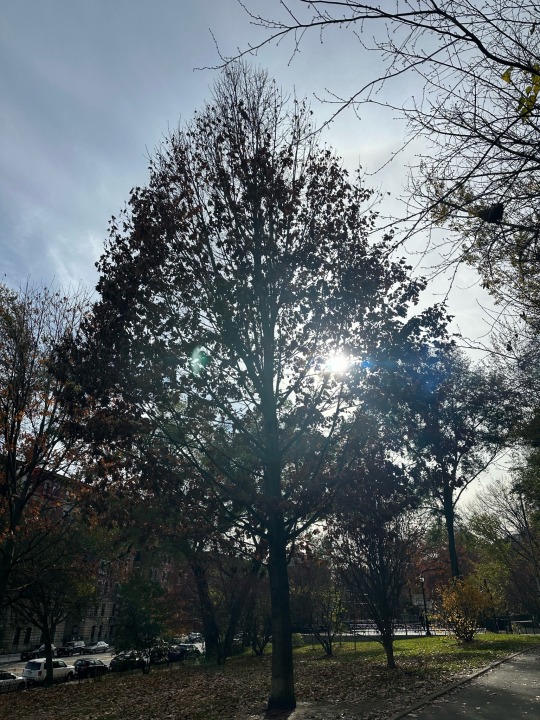
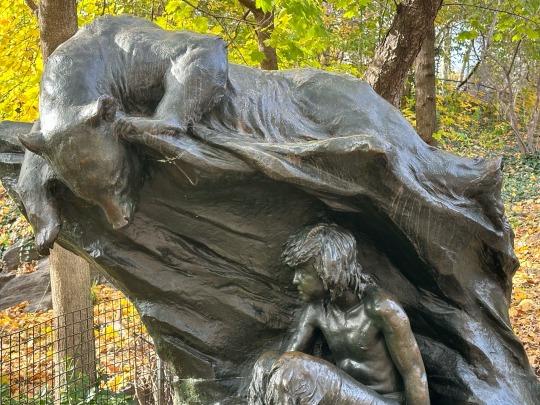
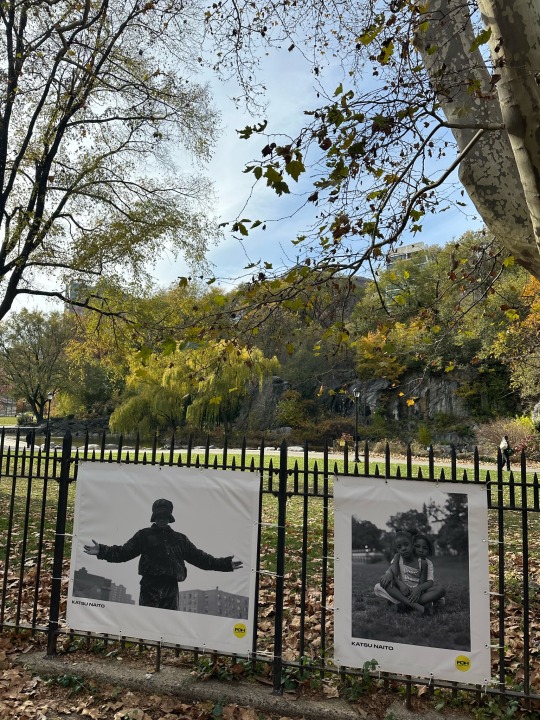
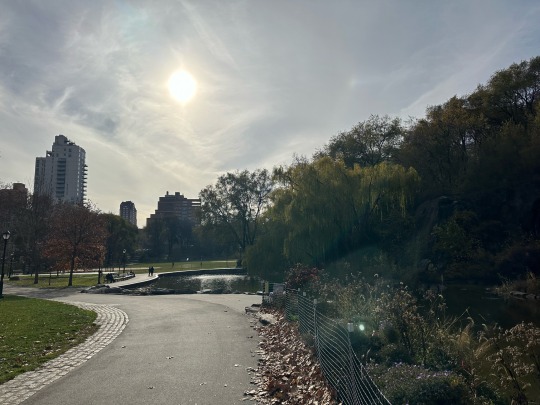
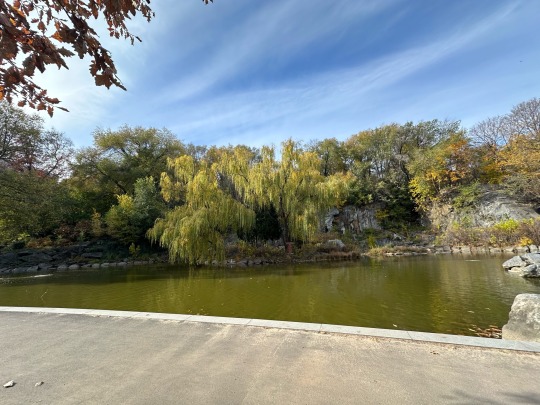
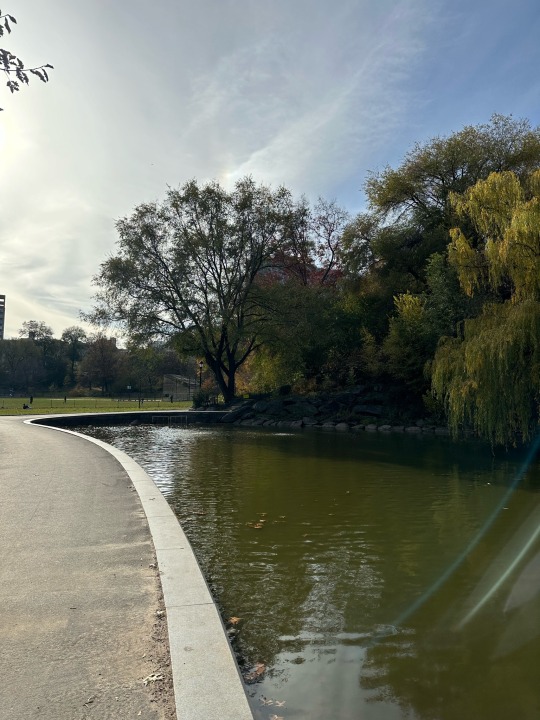
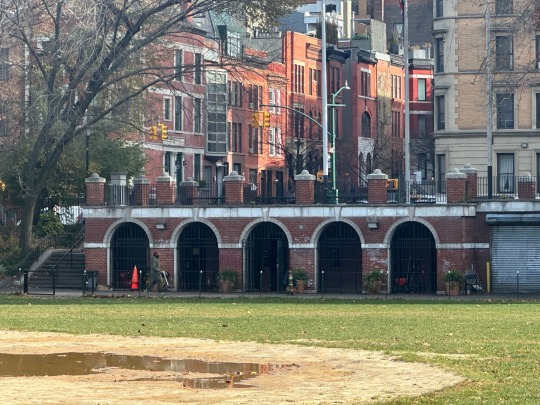
Exploring NYC: Morningside Park, November 2023
2 notes
·
View notes
Text
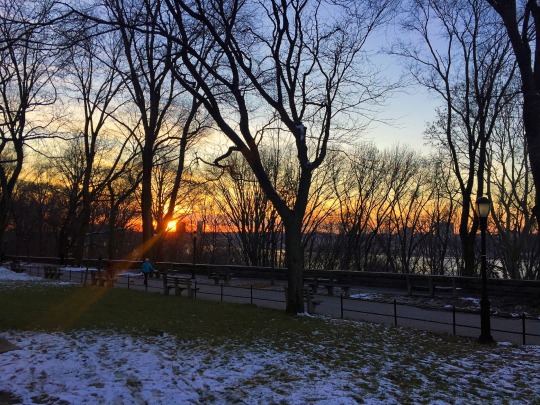

#Riverside Park#Winter#Walking#Snow#Prunus#Shrub#Tree#Sunbeam#Street Scene#Columbia University#Morningside Heights#Hudson River#Manhattan#New York City#New York
13 notes
·
View notes
Text
BUCCAL FAT REMOVAL SPECIALIST
BUCCAL FAT REMOVAL SPECIALIST
When we refer to buccal fat, the term buccal means that we are discussing the cheek area that surrounds the mouth. According to Dr. Swift, the top surgeon for buccal fat removal Brighton Beach has to offer, often times patients will want to bolster the area of the upper cheek, either using facial fillers like Juvederm or Restylane, or even sometimes by using a fat transfer procedure. This is often highly effective and can add the appearance of more prominent cheek bones for a patient, while giving the appearance of a slimmer more well contoured lower cheek — but it is only temporary and for many patients it isn’t ideal because it increases the overall size and ratios of the face. In recent years, many doctors have learned that by using Buccal fat removal New York patients will actually create an even more slimming effect and can do so permanently, although the cost of this would be the need for surgery.
#Buccal Fat Removal Inwood#Buccal Fat Removal Fort George#Buccal Fat Removal Washington Heights#Buccal Fat Removal Hudson Heights#Buccal Fat Removal West Harlem#Buccal Fat Removal Manhattanville#Buccal Fat Removal Morningside Heights#Buccal Fat Removal Central Harlem#Buccal Fat Removal Harlem#Buccal Fat Removal Astor Row#Buccal Fat Removal Sugar Hill#Buccal Fat Removal Marcus Garvey Park#Buccal Fat Removal Le Petit Senegal#Buccal Fat Removal Upper Manhattan#Buccal Fat Removal Midtown NYC#Buccal Fat Removal Midtown Manhattan#Buccal Fat Removal East Harlem#Buccal Fat Removal Upper East Side#Buccal Fat Removal Carnegie Hill#Buccal Fat Removal Yorkville#Buccal Fat Removal Upper West Side#Buccal Fat Removal Manhattan Valley
0 notes
Text
In 1968, students also protested at Columbia University in New York City after students discovered links between the university and support for the United States' involvement in the Vietnam War. (Also included: protesting an allegedly segregated gymnasium to be built in Morningside Park. David Shapiro was one of the students, immortalized here, below, occupying the president’s office.
Shapiro died May 5 at 77. He will no doubt be feted as a poet, artist, and literary critic by his Alma mater, the same Columbia U presently condemning students and having them arrested.
Photo by G. Upham: https://www.icp.org/browse/archive/objects/student-activist-david-shapiro-sitting-behind-university-president-kirks-desk
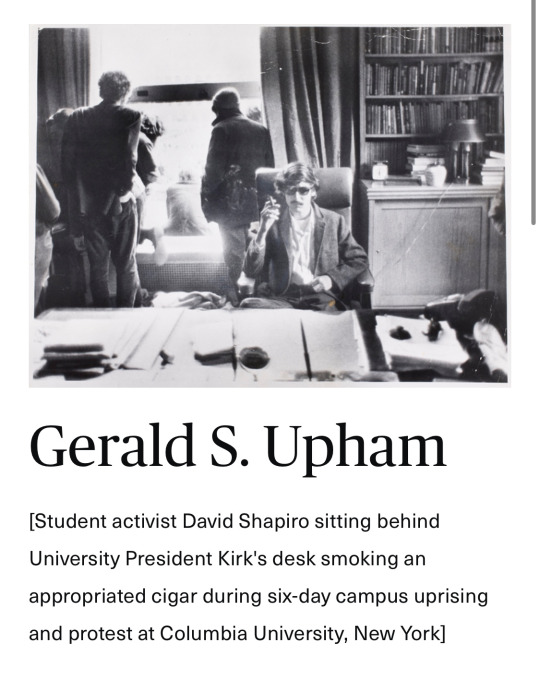
910 notes
·
View notes
Text

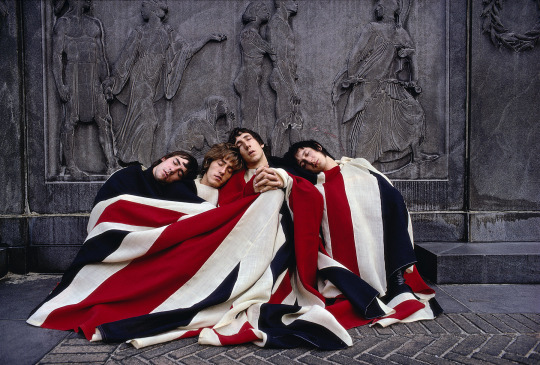
The Who by Art Kane, 1968
Photoshoot for the cover of 'The Kids Are Alright' taken at the Carl Schurz Memorial at Morningside Park, NY
286 notes
·
View notes
Text
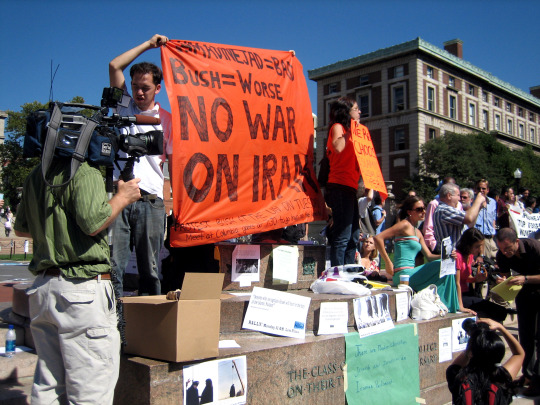
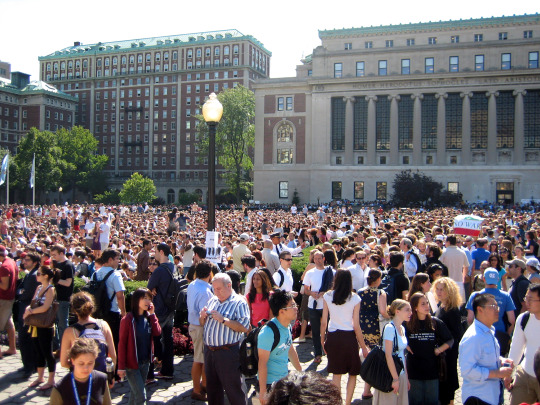
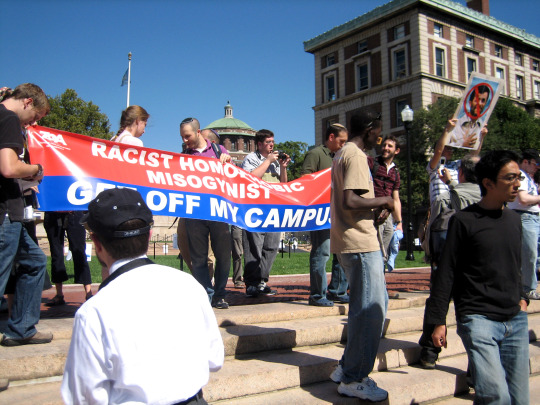
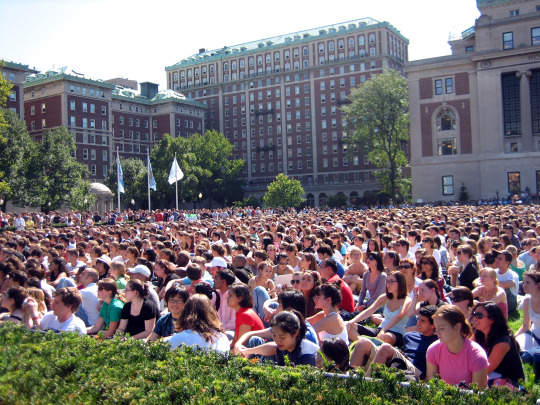
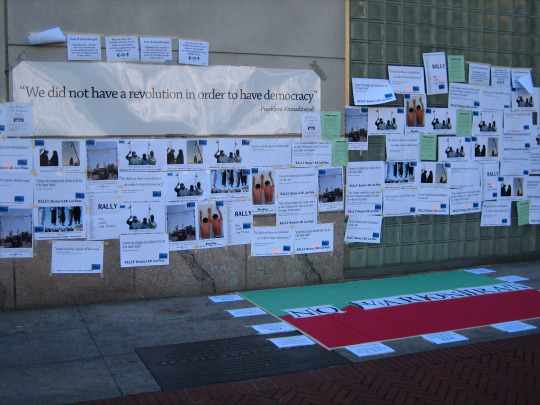

TBT to the late 00s when I was an undergrad at Columbia. It was a time when political activism and student protests saw a renaissance on campus; every year, for all 4 years I attended, there were protests—a resurgence of the spirit of '68. (I remember a meme going around comparing Ivy League schools with "How many students does it take to change a lightbulb at <insert Ivy here>?" The one for Columbia went something like "61. 1 to change the lightbulb, 30 to protest it, and 30 to counter-protest." I couldn't be more pleased, especially since the stereotypes for other Ivies were far less flattering.)
In 2007, then-President of the university Lee C. Bollinger, who was also a Free Speech scholar, invited then-President of Iran Mahmoud Ahmadinejad to speak on campus. There were protests against Ahmadinejad's arrival, and there were counter-protests, the latter calling out George W. Bush and US imperialism and upholding an anti-war message. Here are some photos I took the day of the event:
1 - Counter-protesters
3 - Protesters
4 - Students watching the event
5 - Flyers from protesters and counter-protesters
6 - Media outside the gates on Broadway
That same semester, there was a student hunger strike, calling for a reform of the Core Curriculum and expansion of the Ethnic Studies program and protesting the university's gentrification of Harlem. (I didn't take photos; this time I personally knew the protesters.) Students camped out in tents on the Lawn. And you know what? They weren't evicted. They weren't suspended. The cops weren't called. In fact, the university administration negotiated with them and agreed to meet some of their demands—the strikers won a new Major Cultures seminar requirement as part of the Core.
In 2008, on a panel commemorating the 40th anniversary of the 1968 uprising, Bollinger said, “You simply do not bring police onto a campus. All the assurances in the world cannot be kept” that police presence on campus will not result in violence.
Etc.
To the current student protestors, you are continuing Columbia tradition, and I am proud of CU students for sparking a nationwide movement. (The occupation of Hamilton Hall also harkens back to '68, when students seized control of the building to protest the Vietnam War and the proposal of a gymnasium in Morningside Park with separate entrances for students vs. the community. The spirit lives on indeed.)
To the current administration under Minouche Shafik... Sending in an armed and militarized NYPD as a response to kids peacefully protesting? How does that keep anyone safe? I can't imagine Bollinger would've been OK with how you're handling the situation. We alumni are watching.
// (c) Jenny Lam 2007
#free palestine#ceasefire now#palestine#gaza#ceasefire#from the river to the sea palestine will be free#palestine will be free#save palestine#free gaza#throwback#00s#2000s#columbia university#protest#student protests#nyc#history#activism#protests#columbia
195 notes
·
View notes
Text
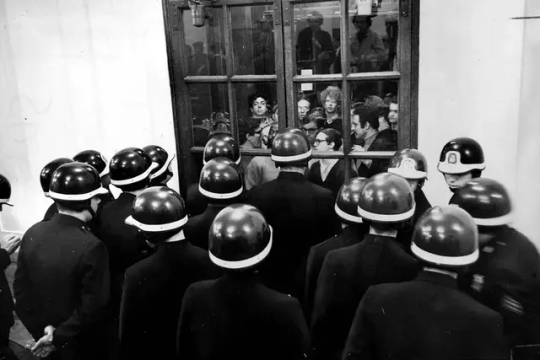


(2024)
APRIL 1968..#ColumbiaUniversity In 1968, students occupied buildings and hundreds were arrested. Credit...Larry C. Morris/ TheNewYorkTimes
A protest 56 years ago became an important part of Columbia’s culture.
During the Vietnam War, students seized campus buildings for a week until university officials and the police cracked down.

By Vimal Patel April 18, 2024
Columbia University is no stranger to major student protests, and the uproar that unfolded at the institution on Thursday had echoes of a much bigger revolt in 1968 — another time of upheaval over a war many students deeply believed was immoral.
That year, in April, in the throes of the Vietnam War, Columbia and Barnard students seized five campus buildings, took a dean hostage and shut down the university.
By April 30, a week after the protest started, university officials cracked down.
At about 2 a.m., police began clearing students from Hamilton Hall “after entering the building through underground tunnels,” according to the student newspaper, The Columbia Daily Spectator. Minutes later, police entered Low Library, again through tunnels, removing occupying students by force.
By 4 a.m., they had cleared all buildings, resulting in more than 700 arrests — one of the largest mass detentions in New York City history — and 148 reports of injuries, the student newspaper reported. Officers trampled protesters, hit them with nightsticks, punched and kicked them and dragged them down stairs, according to a New York Times report.
Most of the injuries were cuts and bruises, relatively minor as compared to some of the brutal arrests of protesters at the height of antiwar and civil rights demonstrations at the time. The university also sustained some property damage, including smashed furniture, toppled shelves and broken windows.
In the end, the protesters won their goals of stopping the construction of a gym on public land in Morningside Park, cutting ties with a Pentagon institute doing research for the Vietnam War and gaining amnesty for demonstrators.
The protests would also lead to the early resignations of Columbia’s president, Grayson L. Kirk, and its provost, David B. Truman.
The fallout from the violence hurt the university’s reputation and led to reforms favoring student activism. Today the university touts its tradition of protest as part of its brand.
On Thursday, another Columbia president, Nemat Shafik, took what she called an “extraordinary step” and authorized the New York Police Department to clear out a student encampment on campus.
#NEMAT SHAFIK#gaza#free gaza#1968#april 2024#jerusalem#tel aviv#Israel#BDS#WAR ON GAZA#free palestine#PALESTINE NEWS#UCLA#nyc#NYPD#friday#Good Friday#FREE#art#artist#contemporary art#history#world history#NEWS#updates#columbia university#pulitzer#WAR#vietnam war#students
23 notes
·
View notes
Text

GIVE YOUR HEART A BREAK - WANDA MAXIMOFF X F!READER
ㅤㅤ ㅤㅤ
Summary: A request based on the song 'Give Your Heart a Break'.
Emobaby Wanda is trying.
Enjoy @imnotasuperhero! Request here.
ㅤㅤ ㅤ
As you know me, Jules is portrayed by Adelaide Kane.ㅤ
ㅤㅤ ㅤㅤ
Chapter I Chapter II

NEW YORK, 2016.-
ㅤㅤ ㅤ
“That will be it, thank you, Jules.” The brunette thanked the waitress with a kind smile and stepped aside to wait for the order, putting back just one of her headphones.
ㅤㅤ ㅤ
The rainiest day of September, Wanda left earlier the Compound that Monday, of course she took advantage of the free time to catch up on her book, and drink coffee at her favorite place.
She needed to get out, needed to get rid of the pain that his death left in her.
ㅤㅤ ㅤ
A nice coffee with a bit of almond milk just to give it some flavor. Wanda was wearing a dark scarlet coat, a black dress and boots of the same color, one of the outfits that made her feel safe, Pietro used to say that it 'suited her'.
ㅤㅤ ㅤ
Wanda sighed.
ㅤㅤ ㅤ
The stress that she felt every day in those training sessions vanished when she got to the coffee shop and had her favorite drink; could breathe again and focus on the book. Escaping from reality, the reality where she was an avenger. Something that not even in her wildest dreams would have imagined.
ㅤㅤ ㅤ
The tabloids showed a picture of her exclaiming ' The new avenger: a young and inexperienced kid' or the 'Sokovian mutant' who now lived in the Avengers Compound was removed thanks to Stark a few weeks ago, she could once again enjoy her anonymity.
ㅤㅤ ㅤ
“Wanda” Jules finally called.
Wanda took the coffee mug, it was her favorite. One with many stickers, some of them songs or books the girl liked but above all: the name of her twin brother, Pietro. She always carried it with her, it was one of the many things that Pietro had stolen for the people of Sokovia, but that mug was for her.
ㅤㅤ ㅤ
Thanking the barista, Wanda walked over to one of the empty tables by the largest window, whose view included Manhattan Avenue, just between Central Park and Morningside Park. Leaving the coffee on the table, she took a book out of her bag.
ㅤㅤ ㅤ
In the time Wanda was there, she chose to snoop around the top shelf in the Compound library, books that were or used to be her favorites and which she considered re-reading as a good hobby; get rid of Bruce’s stoichiometric formulas, or Natasha's Judo grappling techniques.
ㅤㅤ ㅤ
She opened that book on page 64; an automatic smile spread on those lips. Pietro's jokes about her every time he saw her reading a book came to her mind, the times he tried to cheer her up when they didn't have enough to eat, watching his sister read a book over and over again.
ㅤㅤ ㅤ
“Hello there. What are you reading?” A charming voice made Wanda look up. In front of her was a beautiful woman, with brown hair, a friendly smile and a coffee cup in her hand. “You seem to have more fun than anyone else here, or maybe I'm just really bored.”
ㅤㅤ ㅤ
How long has she been sitting there? How come she hadn't seen her? Was she too lost in the reading? Wasn’t even aware of what was happening around her until that voice spoke to her.
Oh, Natasha would be furious.
ㅤㅤ ㅤ
Wanda raised one of her eyebrows, but she looked down at her book again. But not intimidated by the Sokovian, Y/N continued.
ㅤㅤ ㅤ
“Is that book good? What is it about?” The woman said before taking a sip of her steaming coffee. “Cool coffee mug by the way.”
ㅤㅤ ㅤ
Wanda just sighed. “I’m sorry, but I prefer to be alone, please.” The sokovian girl said with her accent, brought her book a little closer as well as the coffee mug, from which she drank a big sip before continuing to read.
ㅤㅤ ㅤ
Hoping those words would have an effect on the stranger, and although she didn't want to be rude, Wanda didn't really want her free time invaded by someone else. She was already under a lot of stress the last few days, the last thing she needed was someone she doesn't even know bothering her.
ㅤㅤ ㅤ
“Today feels like a good day to have a coffee, maybe a donut, I love donuts but the sugar sprinkled ones.” Y/N watched through the window as the trees moved slowly and the raindrops hit the glass. “I like rainy days, don’t you?”
ㅤㅤ ㅤ
Wanda didn't even look up again, just tried to keep reading, even annoyed by having to read the same page so many times because the woman in front of her kept speaking.
ㅤㅤ ㅤ
“I'm sorry, I didn't ask your name… ” The woman in the leather jacket nodded, leaning on the table to better see the cover of that book. “Well, you’re a bit quiet, I like that...”
ㅤㅤ ㅤ
Y/N continued talking about the city, the weather, the coffee she ordered, the music video playing on the screen, but Wanda never answered.
ㅤㅤ ㅤ
She pretended to ignore this woman until the stranger left, but it didn't seem like a good tactic after all since the stranger didn't seem bothered with Wanda’s indifference, she even said goodbye almost half an hour, flashing a sideways smile that Wanda barely managed to see out of the corner of her eye.
ㅤㅤ ㅤ
The Sokovian rolled her eyes when she was finally alone once more, but had to finish her coffee and run back to the Avengers Compound when she saw Natasha’s text saying they had ‘a job to do’.
Well, at least besides a tedious day of training, something different happened in her life.
ㅤㅤ ㅤ
The story repeated itself the next day and also the day that followed, and the next. Wanda drinking a large latte, a book in hand, and the strange woman with dark hair who always came to sit with her.
ㅤㅤ ㅤ
The endless talks she seemed to have by herself, because Wanda never responded. She tried to read even though she didn't usually moved forward a single page because of that nosy annoying woman.
ㅤㅤ ㅤ
“I like how that makeup highlights your eyes, and your jacket, red and black is really yours.” Y/N smiled and finished her donut. “Well I have to go now, but I hope you have a good day, stranger.”
ㅤㅤ ㅤ
That stranger chose to say goodbye and always leave there half an hour after sitting with her. Wanda returned to the Compound only about five minutes after seeing her leave.
And even though Wanda wanted to be alone with all her heart, that woman with the leather jacket was beginning to grow on her. Hearing her voice seemed… calming, and her sweet perfume was exquisite.
And maybe getting a new routine wouldn't hurt at all.
ㅤㅤ ㅤㅤㅤ ㅤ
Three days passed in the same way, three days in which Wanda decided to arrive always on time and hoping to see the stranger one more time, even though her presence seemed annoying and invasive. She discovered that the stranger's name was Y/N, she read it on the cup Jules gave her everyday.
ㅤㅤ ㅤㅤㅤ ㅤ
When Thursday came, Wanda decided to repeat the routine once more. Although she didn't usually come back to the city on Thursdays since Steve used to organize a movie night -so he could integrate the newbies-, Wanda decided to go anyway, at the same time.
Even tried to look ‘good’, something casual but just enough to make her feel 'pretty', even trying new perfume after parking the car.
ㅤㅤ ㅤㅤㅤ ㅤ
Wanda didn't even understand why she did those things, but the truth is that she hadn't started a conversation with anyone since she lost Pietro.
That afternoon she decided not to use her mug and use a disposable one with her name, maybe that way Y/N would know it.
ㅤㅤ ㅤㅤㅤ ㅤ
Took a seat at her favorite table, starting to read her book hoping to hear that voice that was even more interesting than the pages of any book but to Wanda’s surprise that woman didn't interrupt her again.
ㅤㅤ ㅤㅤㅤ ㅤ
'How strange' she thought.
ㅤㅤ ㅤㅤㅤ ㅤ
“Hey, Jules.” Wanda approached so she could chat with the girl. “Do you know if Y/N arrived today?”
ㅤㅤ ㅤㅤㅤ ㅤ
Smiling a bit surprised by the question, the barista shook her head. “Not today. It's weird, she comes every afternoon but she wasn't here today.”
ㅤㅤ ㅤㅤㅤ ㅤ
“OK thanks.”
ㅤㅤ ㅤㅤㅤ ㅤ
“Do you want me to tell her something if she comes?”
ㅤㅤ ㅤㅤㅤ ㅤ
“No, don’t worry.”
ㅤㅤ ㅤㅤㅤ ㅤ
The Sokovian looked around, her presence was distinctive, she just wasn't there.
Wanda pouted a little bit and decided to continue reading but the silence distracted her even more than Y/N.
Wanda slammed it shut, glanced at the watch on her left wrist and decided to wait.
ㅤㅤ ㅤㅤㅤ ㅤ
5:30 pm Wanda arrived at the coffee shop.
5:45 pm when Y/N didn't appear in front of her.
6:00 pm when she finished her coffee very impatient. Couldn't even concentrate on reading.
6:30 pm when her hopes began to fade and...
7:00 pm when Wanda left the place.
ㅤㅤ ㅤㅤㅤ ㅤ
A sigh and confusion accompanied her back home, thoughts that were tangled like cobwebs impossible to decipher. Come on, she should be glad because now she could return to the book, having some peace, enjoy the solitude and tranquility but on the other side felt a small thorn of disappointment and did not even understand why.
Someone else disappearing from her life in such an unexpected way.
ㅤㅤ ㅤㅤㅤ ㅤ
Wanda was an expert in pushing all feelings to the bottom of the abyss, so she did it one more time, avoiding thinking about what happened with Y/N. Just went back to her mornings training with Natasha and Steve, the lonely lunches, being alone in her bedroom, avoiding Vision and visit to the coffee shop on Friday afternoon.
ㅤㅤ ㅤㅤㅤ ㅤ
Jules handed over her coffee and a bagel, Wanda took a seat at the table by the window and opened her book to page 70 since she hadn't gone too far since Monday.
But as soon as she started the first sentence the door opened and something in her head screamed for her to turn around.
ㅤㅤ ㅤㅤㅤ ㅤ
Y/N entered that place with that presumptuous walk, that side smile while Jules took her order, Wanda didn't even know how those expressions were familiar to her, perhaps she paid much more attention than usual… More than she wanted to admit.
ㅤㅤ ㅤㅤㅤ ㅤ
The Sokovian settled into her seat, her emerald eyes fixed on the letters, hoping that like every afternoon, Y/N would take a seat in front of her. But as soon as she looked up again, she realized that Y/N sat somewhere else. One of the tables in the corner.
ㅤㅤ ㅤㅤㅤ ㅤ
Wanda wrinkled her nose a bit confused, and although her expression indicated how upset she was, just decided to give up and keep reading.
She should be happy, right? Y/N was finally leaving her alone.
She read perhaps two pages before reason left her body, because what she did next didn't seem coherent at all.
ㅤㅤ ㅤㅤㅤ ㅤ
Closing the book - stronger than she expected- Wanda got up and walked over to the table where Y/N was. Her brow furrowed, her lips pressed, her arms crossed. Wanda Maximoff looked at Y/N, who didn't get her attention until the sokovian cleared her throat.
ㅤㅤ ㅤㅤㅤ ㅤ
“Oh, hey.” Y/N settled into her seat. “Do you need something?” Y/N asked, her eyes met the sokovian emerald eyes and although Wanda didn't understand why she felt a little tingle when she looked at the stranger, it was overshadowed by her obvious annoyance.
ㅤㅤ ㅤㅤㅤ ㅤ
“You didn't show up yesterday.” Wanda was encouraged to say out loud, still with her arms crossed and without looking down for a single moment. She was not going to lose this battle. Who the hell did she think she was?
ㅤㅤ ㅤㅤㅤ ㅤ
She was Wanda Maximoff, she was an avenger and one of the strongest ones. Strange moment where Wanda felt proud of herself.
ㅤㅤ ㅤㅤㅤ ㅤ
“I’m sorry, what?” Y/N put aside some papers that she seemed to be going through, the look of surprise and confusion on her face made Wanda hesitate a little this time.
ㅤㅤ ㅤㅤㅤ ㅤ
“You didn't come and now you are sitting here.” The Sokovian mumbled but no other words seemed to come from her lips for a moment. She swallowed and opened her mouth, but it was Y/N who spoke:
ㅤㅤ ㅤㅤㅤ ㅤ
“What do you mean I didn't show up?”
ㅤㅤ ㅤㅤㅤ ㅤ
“You stood me up!” Wanda finally confessed, using a rather high tone of voice, which earned the attention of some curious glances, but as soon as those words left her mouth, Wanda wished she had bitten her tongue. She pressed her lips together and swallowed once more, though decided to take a seat in front of Y/N to avoid making more of a fuss than they already had.
ㅤㅤ ㅤㅤㅤ ㅤ
“Come again?” was the only thing Y/N answered, her frown changed to a smile of amusement.
Oh, that Sokovian accent drove her crazy.
ㅤㅤ ㅤㅤㅤ ㅤ
“You stood me up yesterday and now you are not sitting with me, why are you avoiding me Y/N?” Of course, staying silent had never been an option for Wanda, her mouth made her brain want to hit itself.
Wasn't Wanda Maximoff good at hiding what she felt? Bullshit.
ㅤㅤ ㅤㅤㅤ ㅤ
“The h- I’m not avoiding… how do you know my name?” Y/N narrowed. “Weren't you the one who wanted to be alone?”
ㅤㅤ ㅤㅤㅤ ㅤ
“I just said that the first day, I didn't even talk on the next ones but I...” She crossed her arms.
ㅤㅤ ㅤㅤㅤ ㅤ
“Oh, that’s right. You kept ignoring me so I can’t see the difference. Now you can read without me bothering you.” Y/N waved her hands, shooing her away. “I’m busy, enjoy your afternooon and your book, miss.”
ㅤㅤ ㅤㅤㅤ ㅤ
“I wasn't ignoring you...” Wanda answered in a low voice, she was telling the truth, even though she tried to read or even seemed not to pay attention she remembered everything Y/N said.
ㅤㅤ ㅤㅤㅤ ㅤ
“I really wasn't...” Wanda sighed. “The first day you told me you like the donuts here, I tried them, but I think I prefer bagels. You also asked me about my book, it's not as interesting as you, but it's about some invasion or something where mind control it's the principal weapon. I don’t know, I don't think I chose a good book this time. By the way… I’m Wanda.
ㅤㅤ ㅤㅤㅤ ㅤ
The Sokovian offered her right hand to Y/N and they finally shook hands. A tingle ran through her body, a strange feeling that was initiated and provoked by Y/N’s touch and although Wanda tried to ignore it, she didn't let go for a few seconds.
ㅤㅤ ㅤㅤㅤ ㅤ
Wanda allowed herself to open up little by little, of course without telling her that she was an avenger or who she really was. She was grateful that Y/N didn't even seem to recognize her, so grateful for Tony Stark's pressure to keep her face out of the media.
Little by little Wanda allowed herself to smile, something she hadn't done since Pietro died. She wasn't going to deny that Y/N did everything to see her laugh.
ㅤㅤ ㅤㅤㅤ ㅤ
“Very good, Wanda. That has been fantastic.” Natasha nodded her head after seeing how the girl managed to get rid of two agents without using her powers. “That's all for today, guys.”
ㅤㅤ ㅤㅤㅤ ㅤ
Wanda nodded proudly, fixing her hair to tie it in a ponytail.
ㅤㅤ ㅤㅤㅤ ㅤ
“That was great, you're improving a lot.” Nat smiled as they both walked out of the gym.
ㅤㅤ ㅤㅤㅤ ㅤ
“Thank you.” Wanda nodded a bit shy.
ㅤㅤ ㅤㅤㅤ ㅤ
“I'm glad what you're doing every afternoon is paying off.” The Russian winked and then she walked away to go to her own room.
ㅤㅤ ㅤㅤㅤ ㅤ
Of course, that didn’t go unnoticed in the Compound, Natasha noticed the mood change in Wanda. Like her every day she woke up early so she could have some breakfast on time and train with her.
Of course, she knew what Wanda was doing outside the compound every afternoon. Hell, Natasha was a spy, and seeing how Wanda smiled in that girl's company made Natasha finally feel less worried about her new friend.
Y/N made her feel better, but Wanda was sure of one thing and it was that she wasn't ready to allow herself anything else.
ㅤㅤ ㅤㅤㅤ ㅤ

The brunette put her motorcycle keys in the jacket’s pocket and walked next to Wanda. That afternoon they decided to do something different, instead of staying in the coffee shop they decided to take it to Sutton Place Park and watch the river for a while.
ㅤㅤ ㅤㅤㅤ ㅤ
“How was your job today?”
That question caught Wanda off guard, of course she hadn't told Y/N the truth of who she was.
ㅤㅤ ㅤ��ㅤ ㅤ
How to do it? Hi, I'm Wanda and I'm an avenger. On top of that, I'm a mutant who can read minds and move objects. I could read yours but I don't want to be disappointed.
ㅤㅤ ㅤㅤㅤ ㅤ
Too much complexity, she wished for a world to escape to and Y/N was that now, the woman became her escape every day. She wanted to keep it to herself, or at least that was the advice Natasha gave her.
ㅤㅤ ㅤㅤㅤ ㅤ
“Good. I'm tired, but it’s something I’ve to do, as always, how about you?”
ㅤㅤ ㅤㅤㅤ ㅤ
“Cool, I've been working quite a bit on the project they gave me in class.” Y/N shrugged.
ㅤㅤ ㅤㅤㅤ ㅤ
“You work so hard for it, it will turn out great.” Wanda smiled a little tired and a little nostalgic. “Sometimes I wish I could drop my joob and just… go to college or something.”
ㅤㅤ ㅤㅤㅤ ㅤ
Noticing the sorrow in Wanda's eyes, the brunette pursed her lips thinking if what she was going to say next would be the right thing or if she would destroy everything.
ㅤㅤ ㅤㅤㅤ ㅤ
“That leads to the question I wanted to ask you, do you have Saturday off?” Y/N asked a bit nervously, hiding the blush as she sipped her latte. It tasted really good and especially with the cool breeze blowing against her face.
ㅤㅤ ㅤㅤㅤ ㅤ
“I don't have much to do.” Wanda wrinkled her nose, leaning against the railing to get a better view of the river.
ㅤㅤ ㅤㅤㅤ ㅤ
Nodding, Y/N reached into her jacket pockets for something and held it out to her. “Then the timing is perfect to give you this.”
ㅤㅤ ㅤㅤㅤ ㅤ
In her hands Y/N held two tickets to Cigarretes After Sex, really good ones.
As if she were a light in a cold and dark place, Wanda's eyes lit up and allowed herself to smile.
ㅤㅤ ㅤㅤㅤ ㅤ
Nobody had been interested in that way before, besides Pietro, of course. No one had ever paid attention to her musical tastes before.
ㅤㅤ ㅤㅤㅤ ㅤ
“They’re playing at Webster Hall.” Y/N smiled widely.
ㅤㅤ ㅤㅤㅤ ㅤ
“Are you inviting me to see one of my favorite bands?” Wanda pushed her gently, taking the tickets to get a good look at them. She wasn't going to deny that that gesture made her heart race. “What is this kindness, Y/N?”
ㅤㅤ ㅤㅤㅤ ㅤ
“A date.” She answered without further ado, of course, it left her lips so quickly that it made Wanda and herself blush. “It means I want to ask you out on a date, if you accept.”
ㅤㅤ ㅤㅤㅤ ㅤ
“A date…” Wanda hesitated. “Y/N, I don’t…I don't know what to say.”
ㅤㅤ ㅤㅤㅤ ㅤ
“Yes? Maybe?” The brunette stopped facing her, the difference in height was something that Wanda found charming. “You can say yes.”
ㅤㅤ ㅤㅤㅤ ㅤ
“I just…” Wanda looked down, her hands hold those tickets as if she were holding an eternal treasure. “I don't think… I don't think I'm ready for this, and I don't want to hurt you.”
ㅤㅤ ㅤㅤㅤ ㅤ
Even though Y/N might have taken it the wrong way or could be upset, as Wanda thought she would, Y/N just smirked.
ㅤㅤ ㅤㅤㅤ ㅤ
“Hey, don't push yourself. You're not going to hurt me.” Y/N put a hand on the sokovian's shoulder. “Baby steps.”
ㅤㅤ ㅤㅤㅤ ㅤ
“Baby steps?” She murmured in that Sokovian accent; Wanda frowned.
ㅤㅤ ㅤㅤㅤ ㅤ
“Look, I know you don't like all this.” She wrinkled her nose. “Letting people into your life and I know that for sure it is because of the loss of your brother.”
ㅤㅤ ㅤㅤㅤ ㅤ
“It’s not just my brother… I don't think it's fair…” She remembered the last time Pietro was by her side, remembered pushing away the girl who flirted with him.
ㅤㅤ ㅤㅤㅤ ㅤ
‘Does every girl in Sokovia getting a dress from Paris?’
‘You’re jealous you’re not getting a dress’
ㅤㅤ ㅤㅤㅤ ㅤ
Wanda swallowed hard at that memory.
ㅤㅤ ㅤㅤㅤ ㅤ
“I know.” Y/N was quick to say. “I don't want to pressure you here, I like you.” Y/N smiled when she realized that she had said it. Finally. “Wow, I can finally say it. I like you, Wands. Yeah, I do… and although you’re an amazing friend, you are… different. I know the big heart that hides under that melancholy gaze. Just... let's go to a concert. That's it. Give your heart a break.”
ㅤㅤ ㅤㅤㅤ ㅤ
Those words paralyzed her.
ㅤㅤ ㅤㅤㅤ ㅤ
“I know that it is surely not in your interest to be with someone right now.” The taller woman shrugged. “But…just come see the band with me. We don't lose anything, because I assure you that even if you don't want to... you're not going to lose me. You're my friend.”
ㅤㅤ ㅤㅤㅤ ㅤ
Wanda studied her face, detailing every part of it. She was so beautiful. Oh, she wished so badly to read her mind but she didn't feel like it was good breaking it like that. She had to trust Y/N, not everything was solved by getting into people's minds.
ㅤㅤ ㅤㅤㅤ ㅤ
“It's a free trial.” Y/N said again, taking Wanda's hand to caress it for a moment and walk away again.
ㅤㅤ ㅤㅤㅤ ㅤ
“A free trial…” Wanda shook her head smiling. “You are truly something else.”
ㅤㅤ ㅤㅤㅤ ㅤ
“Yeah, maybe.” Y/N smiled and they both leaned on the railings to see the river and feel the breeze, moving their hair.
ㅤㅤ ㅤㅤㅤ ㅤ
The smile on Wanda's lips and her slight blush showed that without a doubt, she was going to try it.
ㅤㅤ ㅤㅤㅤ ㅤ
And that Saturday Y/N kissed her for the first time, to the rhythm of 'Nothing's Gonna Hurt You, Baby' in the background. And her hearts beat together as if they were part of the melody. Their lips complemented each other so well, and their hands intertwined the love… one that would never go away.
ㅤㅤ ㅤㅤㅤ ㅤ
“Let me give your heart a break” She whispered in her ear as Wanda hugged her, hiding her smile. Feeling happy for the first time.
ㅤㅤ ㅤㅤㅤ ㅤ
After that date they decided to go eat some pizza together; Wanda laughed like she never laughed before and she felt how her heart was breaking all the ice barriers to let that warmth invade her.
ㅤㅤ ㅤㅤㅤ ㅤ
Two weeks where they got to know each other, some dates which were great. Y/N was proud as they walked hand in hand together.
Wanda Maximoff's warm hand against hers as they walked through the cool New York night.
They took the subway together from the Bowery to Soho, but when they left the station the storm began to fall on them, making the girls laugh out loud.
ㅤㅤ ㅤㅤㅤ ㅤ
“Nooo! Come on!” Y/N complained taking off her jacket and trying to cover Wanda but was imposible. Laughing they ran through the streets, splashing with each step, pushing each other, playing and just having fun.
They tried to call some taxis but neither stopped when they saw that these two were both completely soaked.
ㅤㅤ ㅤㅤㅤ ㅤ
“I didn't even want to go in that junk anyway!” Y/N yelled, amused when the last taxi just honked and sprayed them with even more rainwater.
ㅤㅤ ㅤㅤㅤ ㅤ
“What do we do now?” Wanda asked, taking refuge under the roof of a Chinese restaurant when she heard the loudest thunder of her life, a lightning lit up the city.
ㅤㅤ ㅤㅤㅤ ㅤ
“My apartment is near…” Y/N proposed, trying not to sound too bad. “If you want, sure.”
ㅤㅤ ㅤㅤㅤ ㅤ
And she was grateful that her brain allowed to speak. Y/N sighed when she saw Wanda with her wet hair, hugging herself.
She looked so…amazing.
ㅤㅤ ㅤㅤㅤ ㅤ
Biting her lower lip, the Sokovian nodded wordlessly before beginning the walk to Y/N’s home. Together.
ㅤㅤ ㅤㅤㅤ ㅤ
Even though the guilt of not telling Y/N who she was or what she did sometimes choked her, Wanda finally had something of hers. Something no one could touch, something she couldn't lose.
ㅤㅤ ㅤㅤㅤ ㅤ
In the warmth of the home, they shared a slow and passionate kiss, slow music and the storm accompanied them all night. A night where they made love, where Wanda really got to know what it was like to be loved, needed and touched delicately but also passionately.
The Sokovian's pale, bare back arched as orgasm hit her, and her girlfriend's warm lips traveled down her neck and chest to go with her.
ㅤㅤ ㅤㅤㅤ ㅤ
A mischievous smile that they both shared almost all night, caressing each other, snuggling and sharing warmth.
ㅤㅤ ㅤㅤㅤ ㅤ
“I have to go.” Wanda whispered smiling when she saw that it was already late, stretching her neck so that Y/N would leave those soft kisses on her bare skin. “Natasha is going to kill me if I’m not there.”
ㅤㅤ ㅤㅤㅤ ㅤ
“Come on, call your work, say you're sick.” Y/N begged between kisses. “Stay with me.”
ㅤㅤ ㅤㅤㅤ ㅤ
Wanda wished she could.
ㅤㅤ ㅤㅤㅤ ㅤ
“Can't.” The sokovian pouted and kissed Y/N’s lips, the lips of that woman who little by little won her heart. Completely hers. “I'll call you later so we can talk… I promise we'll see each other tomorrow.”
ㅤㅤ ㅤㅤㅤ ㅤ
“Are you sure?” Y/N narrowed her eyes playfully, watching as Wanda got up from the bed. Smiling at her from time to time; oh she was so damn beautiful. And Y/N was so whipped. “I'm going to miss you, Wands.”
ㅤㅤ ㅤㅤㅤ ㅤ
“I'm going to miss you too, detka.” Wanda replied before kissing her lips once more, leaving that room behind with much regret.
But then she smiled, knowing that she could come back later.
ㅤㅤ ㅤㅤㅤ ㅤ
Right?
ㅤㅤ ㅤㅤㅤ ㅤ

With a bouquet of flowers that she chose specifically for Wanda, Y/N went to the cafe ready to see the girl she kept thinking about.
Jules smiled when she saw her once more and gave her typical latte.
ㅤㅤ ㅤㅤㅤ ㅤ
“Here's yours... Wanda hasn't arrived yet, do you want me to make hers now?”
ㅤㅤ ㅤㅤㅤ ㅤ
“She hasn't arrived yet?” Y/N frowned. “No, I'd better wait for her.”
ㅤㅤ ㅤㅤㅤ ㅤ
Somewhat confused by the delay -something very strange in Wanda-, Y/N sat at her special table so she could wait for her beloved.
ㅤㅤ ㅤㅤㅤ ㅤ
But the minutes passed and her coffee got cold. Y/N's gaze remained on the window, waiting to see the brown hair go by, and breathe in relief.
But that never happened, she waited an hour and decided to call her but Wanda didn't answer.
ㅤㅤ ㅤㅤㅤ ㅤ
‘The person you are trying to call is not accepting calls at this time’
ㅤㅤ ㅤㅤㅤ ㅤ
What the hell was going on? Y/Ntried to send her endless texts, she called Wanda even more times but only heard the voice of the answering machine tell her the same thing over and over again.
She looked at her texts and as if by magic -or a very good hack system- everything disappeared. As if their chat never existed.
ㅤㅤ ㅤㅤㅤ ㅤ
‘The person you are trying to call is not accepting calls at this time’
ㅤㅤ ㅤㅤㅤ ㅤ
She was about to go crazy.
Or maybe she was overreacting?
What was happening?
ㅤㅤ ㅤㅤㅤ ㅤ
‘If you lose your one and only… There's always room here for the lonely’ Neon Moon by Cigarettes after sex was playing on the radio.
ㅤㅤ ㅤㅤㅤ ㅤ
Y/N lowered her head to look at her second black coffee of the evening, noticing her reflection in it and realizing that maybe destiny was giving her a sign.
ㅤㅤ ㅤㅤㅤ ㅤ
“Y/N, you should see this.” Jules, who seemed surprised looking at the TV, decided to turn up the volume on the News.
ㅤㅤ ㅤㅤㅤ ㅤ
But Y/N didn't pay attention until Jules called out to her again. This time in a more serious and desperate tone.
And when Y/N finally saw the television, she got up from her seat to get closer and get a better look. Not being able to believe what she was watching right now.
ㅤㅤ ㅤㅤㅤ ㅤ
“Criminals? Criminals, that's just the word I was looking for them, Janet. As you can see, now they transfer Clint Barton, Wanda Maximoff and Samuel Wilson to a prison for enhanced people called 'The Raft'. For collaborating with Steve Rogers who is right now an enemy of the United States. Being an avenger doesn't give them the right to break laws. And whoever breaks the rules in America will have consequences. Let this be a message for everyone out there.” Said one of the NEWS reporters.
ㅤㅤ ㅤㅤㅤ ㅤ
ㅤㅤ ㅤㅤㅤ ㅤ
Oh, no.
Please no.

I hope you liked it, this is a request from my friend @imnotasuperhero. 🐻
the cutest and lovely people tags ✨@blckrwidow @imnotasuperhero @wandsmxmff @dudaaaluthor @marvell-love - @ etheriaaly - @idcplss - @how-to-disappearrr - @simp4nat - @scarletwitchofthewilds - @cristin-rjd - @lonewalker17 @zairaaaa @mrscromanoff @kacka84 @helladumbsstuff @dandelions4us @karsonromanoff @trikruismybitch @danicarpediem
I can’t remember who asked me to tag them in my fics, if you want, comment and I’ll tag you.🐻
If you all have more requests, feel free to send them to me.
222 notes
·
View notes
Text
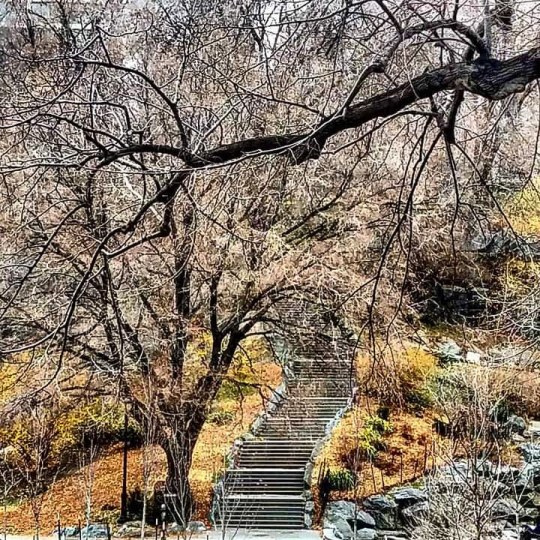
A stairway in Morningside Park, Manhattan.
26 notes
·
View notes
Note
Who do you consider to have been some of the most important / formative mayors of New York?
This is a great question, and actually rather difficult to answer, because for the longest time both Tammany Hall and the Whig/Republican machine tended to prefer mayors who were dull but reliable non-entities. Starting in 1824, NYC was divided into wards that elected Aldermen and Assistant Aldermen to the Board of Aldermen and the Board of Assistants, who together made up the bicameral Common Council. This led to a system whereby the real political action was shunted to the local level, where the ward's Aldermen and the ward boss (and his precinct bosses) ran the show.
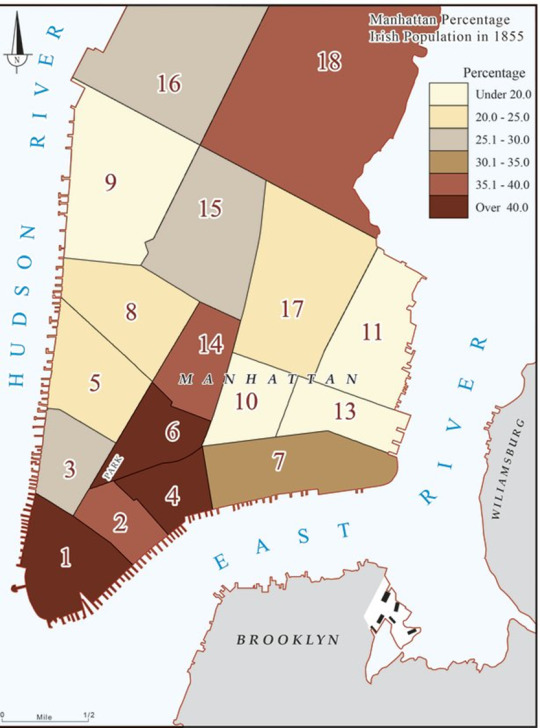
The downfall of Boss Tweed led to some reforms, with the bicameral Common Council replaced by a unicameral Board of Aldermen who were elected from larger State Senate districts or at-large, as part of the Whig Party's drive to dilute the power of Tammany's Irish Catholic voting base. This would change somewhat when the five boroughs were consolidated into Greater New York in 1898, which added the borough presidents and the Board of Estimate into the mix, and then again in 1901 and so forth.
However, the overall trend was a weak mayor system where real political power was fairly evenly distributed between aldermen (who were not only the city's legislatures but were also represented on the Board of Estimate through their President), the borough presidents, the mayor, and the comptroller.
So the major players in NYC politics tended not to be mayors:

Dewitt Clinton was incredibly transformational, but despite serving three terms as mayor his real mark on New York was as governor where he was the driving force behind the construction of the Erie Canal.
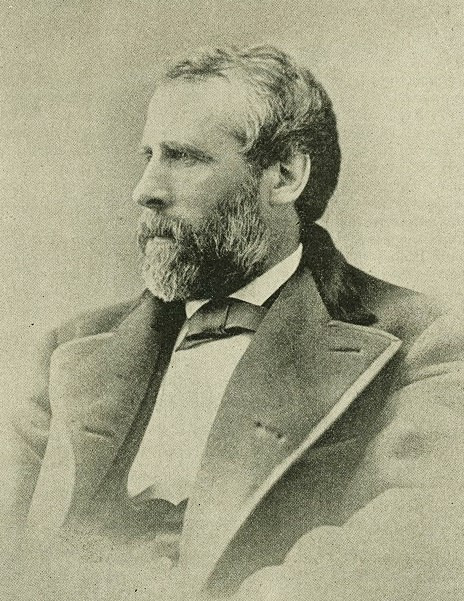
Andrew Haswell Green, the "Father of Greater New York," was responsible for the creation of Central Park, the New York Public Library, the Bronx Zoo, The Museum of Natural History, the Metropolitan Museum of Art, Riverside, Morningside, and Fort Washington Parks, Columbus Circle, and the consolidation of Greater New York - but he never served as mayor. The original Robert Moses, Green's political power came from his leadership of the Central Park Commission, the Greater New York Commission, a six-year stint in the Comptroller's office, and his position on a number of NGOs.
But if we're talking transformative mayors, there is one name that rises above all the rest: Fiorello goddamn LaGuardia.

There had been other reform mayors before him - Seth Low had established the Civil Service, John P. Mitchel brought scientific management to city government - but none of them had ever been able to get re-elected. Unlike the wealthy WASP reformers, LaGuardia knew how to beat Tammany at the ethnic politics game. Tammany's strength had always been in the Irish wards of the city, and while they had tried to divide-and-rule by promoting the naturalization of Russian and Polish Jews in return for them voting for Irish-American politicians in the Lower East Side while noticably neglecting the naturalization of Italians, the emergence of second-generation Jewish and Italian voters meant that this strategy had run its course.
Born to a Sephardic mother from Trieste and a lapsed Catholic father from southern Italy, Fiorello had an astonishing knack for transcending ethnic political boundaries in New York City - he spoke Italian, German, Yiddish, and Croatian, but he was also a progressive Republican and Episcopalian (which meant he could speak middle-class WASP too). LaGuardia won the 1933 mayoral election by bringing together a Fusion coalition that brought middle class German-American Republicans together with Italians and Jews, a coalition that he would expand in 1936 by bringing socialists, unions, and black voters together into the American Labor Party.
Over his twelve years as Mayor, LaGuardia was almost pathologically active (in a way that's oddly reminiscent of Henry II), transforming almost every aspect of New York City:
Jobs for the Unemployed:
LaGuardia's immediate mission as mayor was to fight the Great Depression that had had left a third of the City unemployed. He did this by forming an enduring alliance with FDR in which the New Deal would provide NYC with unpredecented level of federal support in exchange for NYC becoming the New Deal's model city - the first of the "Little New Deals." In his first hundred days in office, LaGuardia convinced FDR to give New York City a full 20% of the Civil Works Administration's work relief budget. This put 200,000 New Yorkers back to work - and this would only be the beginning of New York City's experiments with direct job creation.
As part of Fiorello LaGuardia's "Little New Deal," LaGuardia's new Parks Department employed 70,000 workers - paid for by CWA and later WPA money - to rebuild New York City's parks, constructing the Central Park Zoo and 60 playgrounds in the first year.
When the New Deal created the Works Progress Administration in 1935, LaGuardia once again lobbied FDR to put NYC first in line. This culminated in some 700,000 New Yorkers - a tenth of the city's entire population - getting jobs through the WPA and other New Deal programs. Together with the Parks Department, LaGuardia and Robert Moses would mobilize this workforce to completely transform the city.
Public Works:
This is where we have to discuss Fiorello LaGuardia's fateful decision to make Robert Moses his master builder. While Moses was in the process of becoming the "Power Broker" before LaGuardia - he had already been made president of the Long Island State Park Commission and chairman of the New York State Council of Parks - LaGuardia enabled his ascent to the heights of power by making him Parks Commissioner, Commissioner and then Chairman of the Triborough Bridge Authority, Commissioner of the NYC Planning Commission, and Chairman of the Emergency Public Works Commission.
The pact between them was simple: LaGuardia would give Moses the public appointments he needed to consolidate public works across the city and would steer New Deal public works money through Moses' agencies, and in exchange Moses would be LaGuardia's master builder with a mandate to "build it quickly and build it well." This was not an easy task, because Robert Moses was a political enemy of FDR and FDR tried to bar him from being given any WPA or PWA funding, but the mayor was able to persuade Roosevelt that it was more important that LaGuardia's proposed $1 billion public works program for NYC be carried at speed and administered efficiently.
As LaGuardia's workhorse, Moses would oversee almost all of NYC's public works, including the West Side Highway, the future FDR Drive, the Brooklyn Battery Tunnel, the Triborough Bridge, the LaGuardia and future JFK Airports, and Jones Beach Park, among others. LaGuardia would also construct the Sixth Avenue Subway line, the Queens-Midtown Tunnel and the Lincoln Tunnel without Moses (who was completely uninterested in mass transit and who always preferred bridges to tunnels).
In addition to these major projects, LaGuardia with and without Moses built the city's first municipal power plants, 37 sewage treatment plants, 9 fire houses, 142 elementary schools and 22 high schools, half of NYC's then-23 municipal hospitals, eight District Health Centers to provide preventative, specialized, and public health immunization care, and the first 14 of the City's public housing projects.
City Government:
To dismantle Tammany's patronage system, he began to massively expand the civil service to eliminate patronage jobs, and then when Tammany beat him on a government reform bill in 1934, he simply kept pushing. He pushed through the LaGuardia Reform Charter of 1938 that abolished the Tammany-dominated Board of Aldermen and replaced it with a City Council elected by Single Transferrable Vote, established the Board of Estimate as a central administrative body with powers over the city budget, public contracts, franchises, and land use - crippling Tammany's ability to raise money through graft and kickbacks.
To transform New York City into a "strong mayor" model, he undertook a campaign of transforming independent agencies scattered across the five boroughs into a system of unified citywide departments or public authorities that answered directly to the mayor and gave him unprecedented state capacity. In 1934, he formed the Parks Department and the New York City Housing Authority; in 1936 he formed the Department of Buildings and the City Planning Commission; in 1938, he restructured the Department of Welfare to run the city's social welfare programs and a massively expanded public hospital system; in 1940, he took over the IRT (operating the 1, 2, 3, 4, 5, 6), and the BMT and IND (operating the A, B, C, D, E, F, G, J, L, M, N, Q, R, W, and Z lines), unifying the NYC subway system for the first time.
To deal with police corruption, LaGuardia appointed Lewis Valentine to purge the NYPD so that the mayor could use it (and Thomas Dewey) in a crusade against the mafia's gambling, racketeering, and vice operations. This marked a rare period of honesty and effectiveness in the NYPD, although after WWII the system of protection rackets and mafia corruption would eventually re-establish itself.
Ironically, this exhaustive list of accomplishments really made it hard for later mayors to distinguish themselves, because mostly their task was completing, managing, or mis-managing the system that LaGuardia had built. After LaGuardia I would say that Robert Wagner Jr. (established public sector collective bargaining, created CUNY, Lincoln Center, Shakespeare in the Park, and dealt the killing blow to Tammany) and John Lindsay (see my previous post, but chiefly scatter-site housing, the civilian complaint review board, and the Knapp Commission on police corruption) are on my list of formative mayors.
After them, there have been long-serving mayors and good mayors, but unfortunately not the two combined.
#history#historical analysis#nyc history#nyc mayor#fiorello laguardia#tammany hall#urban history#urban studies#urban politics#political machines#new deal#robert moses#infrastructure
28 notes
·
View notes
Text
THIS DAY IN GAY HISTORY
based on: The White Crane Institute's 'Gay Wisdom', Gay Birthdays, Gay For Today, Famous GLBT, glbt-Gay Encylopedia, Today in Gay History, Wikipedia, and more … March 2


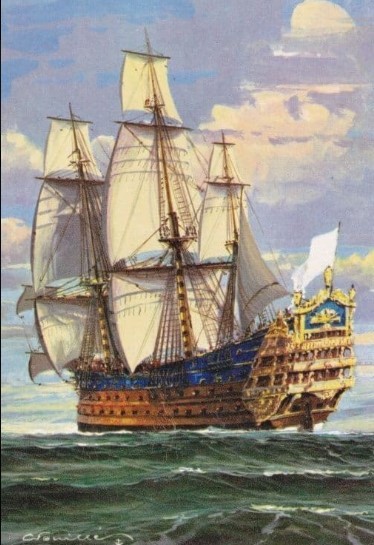
1799 – U.S.Congress adopts a law to "suppress all dissolute, immoral, and disorderly practices" on Naval ships.

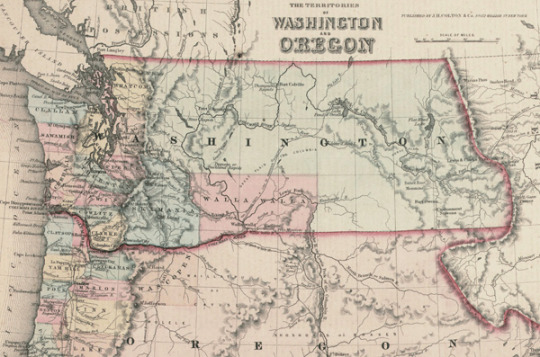
1853 – The Washington Territory is created and given all laws of Oregon. Since Oregon doesn't have a sodomy law, Washington doesn't get one, either

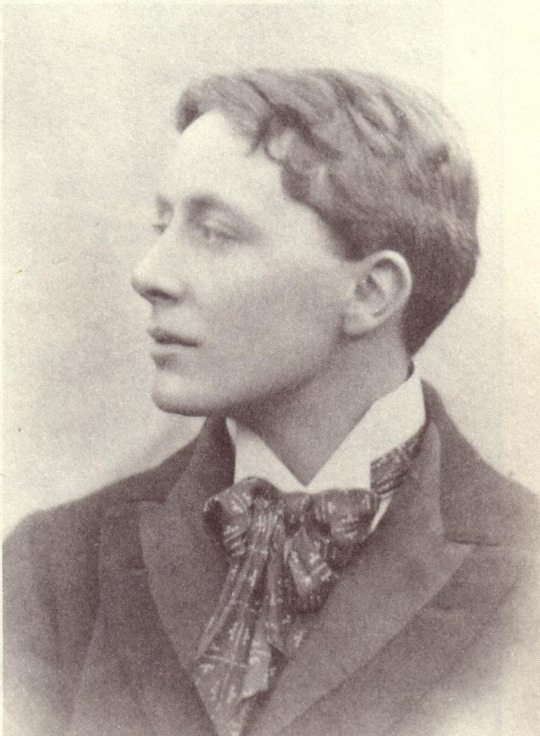
1866 – The English poet John Gray was born on this date (d.1934). His works include Silverpoints, The Long Road and Park: A Fantastic Story.
He is purported to be the inspiration behind the title character in The Picture of Dorian Gray, by Oscar Wilde, with whom he had a homosexual relationship. Gray distanced himself from this rumor. It should also be noted that Wilde's story was serialised in Lippincott's Monthly Magazine a year before their relationship began.His relationship with Wilde was initially intense, but had cooled for over two years by the time of Wilde's imprisonment. The relationship appears to have been at its height in the period 1891-1893.
Like many of the artists of that period, Gray was a convert to Roman Catholicism in the late '90s. He left his position at the Foreign Office and studied for the priesthood at the Scots College, Rome and later became a priest at Saint Patrick's and a rector at Saint Peter's in Edinburgh.
His most important supporter, and life partner, was Marc-André Raffalovich, a wealthy poet and early defender of homosexuality. Raffalovich himself became a Catholic in 1896 and joined the tertiary order of Dominicans. When Gray went to Edinburgh he settled nearby. He helped finance St Peter's Church in Morningside where Gray would serve as priest for the rest of his life. Supposedly (and we highlight *supposedly*) the two maintained a chaste relationship until Raffalovich's sudden death in 1934. A devastated Gray died exactly four months later at St. Raphael's nursing home in Edinburgh after a short illness.

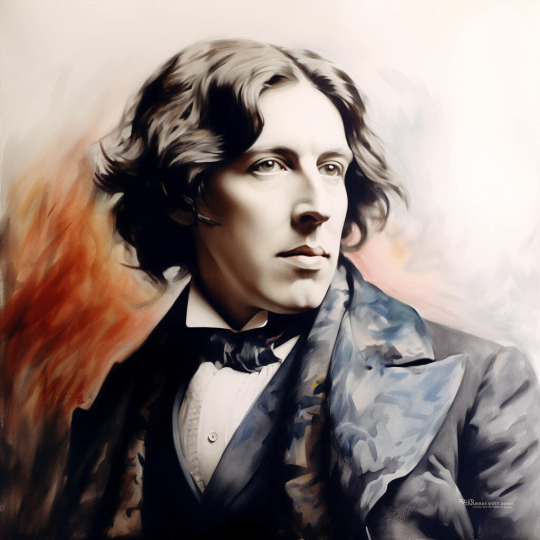
1895 – The legal case of Oscar Wilde begins with the arrest of the Marquess of Queensberry on criminal libel charges for having accused Wilde of being a sodomite. Through three trials the truth of the charge comes out and Wilde is convicted of "gross indecency" and sent to prison for two years.

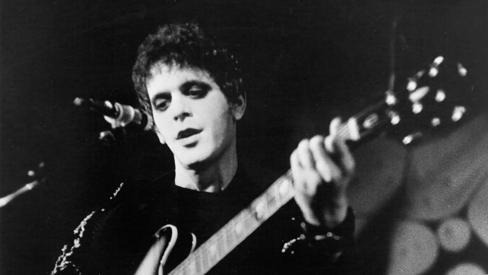
1942 – Lou Reed (d.2013) is an influential American rock singer-songwriter and guitarist. He first came to prominence as the guitarist and principal singer-songwriter of The Velvet Underground (1965-1973).
An enduring but complicated figure whose shadow stretches back four decades to the very beginnings of the American rock underground, Lou Allen Reed was born on Long Island to a middle-class, suburban family - a family with whom he soon found himself at odds, as they were unable to accept his unconventional attitudes and sexually ambiguous behaviour. During his teen years, they went so far as to have him confined in a mental hospital, where he was forced to endure electro-shock treatments and drug therapy as a means to ward off any nascent homosexual tendencies; somehow Reed managed to emerge from this ordeal with his attitudes intact, and, despite his parents' disapproval, continued to pursue his musical interests.
John Cale and Reed enlisted guitarist Sterling Morrison and drummer Angus MacLise to become The Velvet Underground in 1965. Later in the year MacLise quit and was replaced by Maureen Tucker, at which time the band began performing in local clubs and cafés; not long afterwards they came to the attention of art prankster Andy Warhol, who, intrigued by their unconventional approach, offered to assume management duties for the band. During its time, the band was commercially unsuccessful, but has now assumed cult status.
In 1971 a contract with RCA finally initiated the launch of his solo career, and an eponymous album followed in 1972. Primarily featuring Velvets-era material, the release accordingly received the same lack of interest that had plagued the previous band.
In the hopes of avoiding the dismal response given to his first solo effort, Reed enlisted the help of long-standing Velvets fans David Bowie and Mick Ronson to create his second offering, Transformer (1972). Given a thorough glam makeover by the pair, the album featured one of his most commercially successful songs (Walk On The Wild Side) and at last provided some forward momentum to his floundering career.
The lyrics "But she never lost her head / Even when she was giving head" from 1972's 'Walk On The Wild Side' weren't banned by the BBC because the censors didn't know what "giving head" meant.
Lou Reed teamed up with producer Bob Ezrin who produced many rock operas like Pink Floyd's the Wall and Alice Cooper's Billion Dollar Babies. The result was Seattle Junkie Queen. The story is extremely depressing and sad but at times it can be very awe inspiring. Lou Reed does vocals and guitar. "Caroline Says, part 2" is one of the best off this album and actually reworks The Velvet Underground song Lou Reed wrote called "Stephanie Says" which was written about Lou Reed's homosexual lover.
Reed continued to write and perform over the coming years, and by the turn of the century, in distinct contrast to his years with the Velvet Underground, Reed found himself an established and widely-respected member of the music industry.

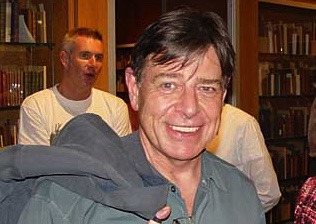
1943 – Michael Denneny, working for St. Martin's Press, was one of the first editors to publish openly gay and lesbian material in the early 1970s, and he bought the highly literary, experimental novel KoolAIDS and enthusiastically likened it to Angels in America. He planned to market it as a "gay novel," but he discovered that his straight colleagues "wondered why I thought of Angels in America as a "gay play" – they just saw it as an award-winning play about AIDS. So we decided to market KoolAIDS as a "literary" novel." Although the few reviews it received were positive, its sales were disappointing.
In a move that shocked industry insiders, editor Michael Denneny on March 1, 2002, abruptly left St. Martin's Press, where he had worked (with a brief intermission at Crown Books) since the mid 1970s. Denneny played the leading role in introducing mainstream publishing to gay and lesbian books. Among the many authors that Denneny edited were Randy Shilts, Ethan Mordden, Christopher Davis, John Fox, Allen Barnett, Paul Monette, Nisa Donnelly, Rabih Alameddine, and Ernesto Maestre.

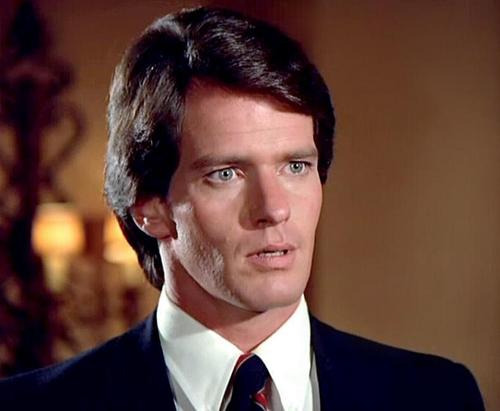
1945 – Gordon Thomson is a Canadian actor widely known for his role as Adam Carrington on the 1980s American prime time soap opera Dynasty.
Thomson began acting while studying English at McGill University in Montreal. One of his earliest roles was "Sir Robin the Brave" in the 1971 version of the Muppets' The Frog Prince. He went on to appear in Canadian television and stage roles, including a stint in Godspell opposite Gilda Radner, Martin Short, and Eugene Levy. In his twenties he also worked as a catalogue model to supplement his acting earnings.
His first main TV role was as Michael Stewart Jr. on the Canadian television serial High Hopes in 1978. He then appeared as Egyptologist Aristotle Benedict White on the ABC daytime soap opera Ryan's Hope from 1981 to 1982. Having received acclaim for stage performances in productions including Love's Labour's Lost, Godspell and Joe Orton's Loot, Thomson advanced to the ABC Talent Development Program. After auditioning for a police series pilot called Callahan, he was instead cast as Dynasty's Adam Carrington. Thomson debuted on Dynasty in October 1982, and remained with the series until its cancellation in May 1989. During the 1985–1986 season, Thomson also appeared in three episodes of the Dynasty spin-off, The Colbys.
After Dynasty, Thomson returned to daytime soaps. In 1990, he joined the now defunct series Santa Barbara (as the third actor to portray the character Mason Capwell). His commitment to Santa Barbara left him unable to reprise his role as Adam Carrington in the TV miniseries Dynasty: The Reunion (1991).
Thomson appeared in eight different series produced by Aaron Spelling: Dynasty, Fantasy Island, Finder of Lost Loves, Glitter, The Love Boat, The Colbys, Beverly Hills, 90210 and Sunset Beach. He guest-starred in a variety of other series such as Murder, She Wrote, The Nanny and Silk Stalkings.
In recent years, Thomson reunited with his Dynasty co-stars in two non-fiction television specials; After Dynasty (part of the UK's After They Were Famous series) in 2002, and Dynasty Reunion: Catfights & Caviar in 2006. That same year, he had small roles in the feature films Poseidon (a remake of The Poseidon Adventure), and the Academy Award-nominated Little Miss Sunshine.
Thomson guest hosted for Britain's ITV network on their then breakfast show Good Morning Britain, for which he covered celebrity events such as Wimbledon and Royal Ascot.
On September 25, 2017, Thomson came out as gay.
"It's not something I've ever announced," Thomson said, "I'm assuming that people know, and now that I'm my age that's fine. I don't go out of my way because it's my generation, I think. I'm probably as homophobic as any gay man alive because of my background." Of course the 80s was hardly a friendly decade for the nation's LGBTQ community, with a mystery disease claiming the lives of gay men before it was identified as AIDS.
"When I was growing up it [homosexuality] was a crime, and then classified as a mental illness," he said. "So you're dealing with that. And the shame, the breathtaking lack of self-esteem, has only just begun to seep out of my soul."

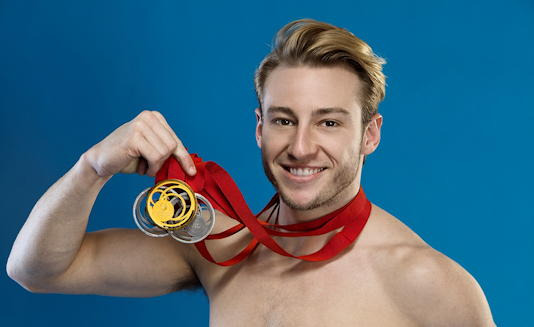
1988 – the Australian, gold-winning Olympic diver Matthew Mitcham was born on this date. He is the 2008 Olympic champion in the 10m platform, having received the highest single-dive score in Olympic history. He is the first Australian male to win an Olympic gold medal in diving since Dick Eve at the 1924 Summer Olympics, and was the only openly Gay male medal winner at the 2008 Beijing Summer Olympics after landing the highest scoring dive in Olympic history.
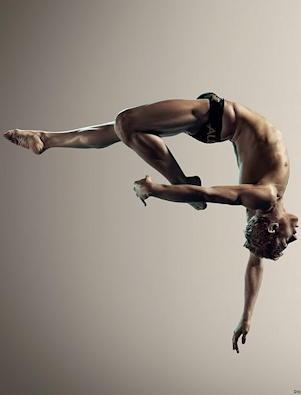
Mitcham was born in Brisbane but lives and trains in Sydney. He publicly came out as gay in 2008 to the Sydney Morning Herald when they were profiling Olympic hopefuls. During the 2008 Beijing Olympics, he was also featured on the cover of the international gay publication The Advocate in August 2008 and March 2009, as well as the cover of Australian gay publication DNA. Mitcham's boyfriend, Lachlan Fletcher, attended the 2008 Summer Olympic Games as a spectator. His trip was sponsored by a grant from Johnson & Johnson's Athlete Family Support Program.
Mitcham gained media coverage in Australia as reporters thought he was the first Australian to compete at the Olympic Games as an openly gay man at the time of his competition. However, Mathew Helm, the Australian diver who won the silver medal at the 2004 Summer Olympics in the men's 10m platform, had publicly announced he was gay before the Olympics began. Other notable gay Australian Olympians include Ji Wallace, who competed at the 2000 Summer Olympics and won a silver medal in the inaugural trampoline event; however, he came out after the Games.
Prior to his 10m platform win, Mitcham was reported to be one of only eleven openly gay athletes competing in the 2008 Beijing Olympics, out of 11,028 athletes from 204 countries.
Mitcham has said when asked to comment on his coming out: "I don't see sexuality as influencing my beliefs or opinions or perceptions of anybody, whether they're gay, straight, bi, trans, experimental, I don't care. I see it as a very uninfluential factor in people." Mitcham has said that after the Beijing Olympics, he received many letters from gay teenagers, "and that was really nice, really humbling".
In 2009 and 2010, Mitcham was selected by readers of samesame.com.au as one of the 25 most influential gay Australians.
On 3 June 2019, he announced his engagement to his British boyfriend Luke Rutherford after being together for seven months.

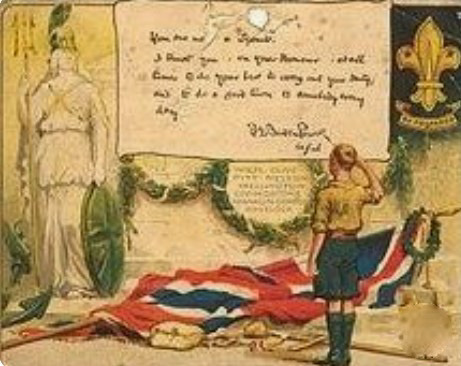
1997 – On this date the British scouting movement, begun by Lord Baden Powell, adopted a policy to protect both leaders and young recruits from harassment because of their 'sexual status'.
Sadly, the American scouting movement, in the throes of the homophobic churches that dominate it— the Mormon and United Methodist churches—refuse to steer toward such an inclusive position.
Currently (2012), Homosexual people are not restricted from membership or leadership positions in Scouts Canada, Scouts Australia, and most European associations, including The Scout Association of the United Kingdom, Ring deutscher Pfadfinderverbände of Germany (German Scout Federation), and the Swedish Guide and Scout Association.



16 notes
·
View notes
Text
Nicole Narea at Vox:
Protests against the war in Gaza have spread to college campuses across the country in the days since students at Columbia University were arrested last week, evoking images of historical student protests that were met with similar backlash.
Recent protests have not yet reached the scale of the major student protests of the late 1960s against the Vietnam War or the 1980s against South African apartheid. But on campus, they may be “the largest student movement so far” of the 21st century, said Robert Cohen, a professor of social studies and history at New York University who has studied student activism. In recent decades, there were mass protests against the Iraq War, as part of the Occupy Wall Street movement, and after the killing of George Floyd, but they were primarily happening off campus.
Just like the protesters that came before them, the students who are now being arrested, and in some cases suspended, for setting up encampments on their campuses in solidarity with Palestinians in Gaza have been demonized by politicians. The vast majority are peaceful protesters who have been overshadowed by a minority of bad actors, some potentially not even affiliated with the universities where these demonstrations are taking place.
Some of their demands, including divestiture from firms that support Israel’s war and occupation, mirror demands that past protesters made to divest from South Africa’s apartheid government. And their discontent has similarly intensified in the face of police crackdowns.
But there are key differences as well. Besides their smaller size, the present-day protests have faced swifter suppression than their predecessors dealt with. In perhaps the most extreme example at the University of Texas-Austin, administrators quickly dispatched police with horses and riot gear absent any signs of violence at a pro-Palestinian protest; charges were later dropped against all 57 arrested. And that signals a deterioration of schools’ commitment to protecting free speech that emerged in the 1960s.
“I think that the fact that this has happened so quickly is unprecedented. And the call for suppression of speech is much more public,” Cohen said.
[...]
What today’s protests do and don’t have in common with the antiwar protests of the 1960s
Columbia students famously occupied university buildings in 1968 in protest against segregation and the Vietnam War before the police forcibly removed them. They wanted Columbia to end the construction of a segregated gymnasium nearby in Morningside Park and to cut ties with the Institute for Defense Analyses, which was researching weapons development for the US government’s war effort.
This all happened against a backdrop of broader anti-war and anti-racism protests across the US, both on and off campuses, that helped energize the student movement. Student protests swept college campuses in the 1960s, involving thousands of students and hundreds of universities. Those protests remain the biggest in history; the current protest movement is “clearly growing, but it’s nowhere near that scale,” said Angus Johnston, an adjunct professor at the City University of New York studying student protests.
The tactics employed by protesters in the 1960s were also vastly different. While many started and remained peaceful, at their most extreme, students rioted, barricaded themselves in buildings, fought with police, burned down ROTC buildings, and raided draft boards to steal or destroy files. They culminated in the Kent State massacre in 1970, when members of the Ohio National Guard shot at a crowd of unarmed student protesters, killing four and injuring nine.
The recent protests, on the other hand, have not gone anywhere near as far.
“What we are seeing in this spring’s wave of protest is students who are not engaging in property damage. They are not for the most part occupying buildings. They are certainly not initiating physical altercations on any large-scale level,” Johnston said. “In the late ’60s, what we were seeing was protests that were much more aggressive in their tactics than the ones that we’re seeing today.”
Some students vocally opposed these tactics in the 1960s. Notably, Donald Trump’s former attorney general Bill Barr was among a group of Columbia students, known as the Majority Coalition, who banded together to defend the university buildings from protesters and were incensed that they could not attend class.
Student opposition to today’s protests has highlighted antisemitic incidents at or around some protests, raising concerns about their safety.
For instance, one student at Columbia wrote an op-ed in Haaretz with the headline, “Jewish Students are No Longer Safe at Columbia University.” He wrote that a masked student on campus showed him a Hamas insignia and said he was “with them,” and that another protester near campus shoved him against a wall.
At the same time, Jewish students have also participated in the protests, which have been largely peaceful.
[...]
One way today’s protests resemble those of the 1960s, however, is that they’ve escalated when university administrators have sent in the police to break them up. Both now and then, students who did not participate in the initial or more radical elements of the protests resented being characterized as confrontational and disruptive.
[...]
Today’s protests have a lot in common with anti-apartheid protests of the 1980s
A better analogy for today’s protests might be the anti-apartheid protests of the 1980s.
Students built up their power in university governance and assembled lobbying groups throughout the 1970s. They also became more of a political force when the voting age was lowered from 21 to 18 in 1972. That meant that, by the time protests against South African apartheid gained steam in the 1980s, they had accumulated more political influence and were better organized.
Their demands of university administrations were practically identical to what protesters are asking for today. They wanted their universities to divest from firms that supported or profited from South African apartheid. And they were effective: 155 universities ultimately divested. And in 1986, the US government also bowed to pressure from protesters and enacted a divestment policy.
Along with increasing protests within South Africa led by organizations including the African National Congress, the Pan Africanist Congress, and trade unions, that kind of international pressure helped force the white South African government to begin negotiations that ultimately ended apartheid, at least officially.
But protesters also didn’t face much pushback in the ’80s because there was a “certain embarrassment among elites in the United States that there was complicity with South Africa’s white government,” Farber said.
“It was kind of pushing against an open door,” he said. “It wasn’t really a polarizing issue.”
That differs from today, when the Gaza war has revealed a major generational divide and there doesn’t exist the same kind of consensus among Americans.
The divestment movement against the apartheid government — which started with universities and then was adopted by the US federal government — also arguably packed a bigger punch due to vulnerabilities in South Africa’s economy, including the fact that many of its goods could be substituted with products from elsewhere.
Assuming that divesting from Israel would be possible (and some say it is not), the scholarship on such divestment movements’ effectiveness is mixed.
It would be very difficult to effectively boycott or ban imports of all Israeli goods, many of which do not have substitutes or at least would be hard to replace. That includes computer technology, medical devices, drugs, and advanced machinery in heavy industry. That doesn’t necessarily mean that divestment from Israel would not have a significant impact on public perception of the war in Gaza and the Israeli occupation. But the Boycott, Divestment, and Sanctions (BDS) movement — which predates the current protests — has so far had a negligible economic impact.
Vox analyzes the comparison and differences between the current college campus protests against Israel's genocide campaign targeting Gaza and past protests.
See Also:
The Guardian: US faculty speak up and stand alongside student Gaza protesters
#Ceasefire NOW Protests#Ceasefire#Ceasefire NOW#Gaza#Israel#Gaza Genocide#Freedom Of Speech#Kent State Massacre#Israel/Hamas War#Israel Apartheid#Apartheid#South Africa#Apartheid Era#BDS Movement#Boycott Divestment and Sanctions#Campus Protests
7 notes
·
View notes
Text
The oral argument in Wright v. Rockefeller, 376 U.S. 52 (1964), is like an hour-long “Californians” sketch for the island of Manhattan:
Well, what did [the state legislature] start with?
They started that the will where they only contained political subdivision, an island, New York County.
It's not a very complicated configuration really.
There were no other county lines or rivers or boundaries that they had to give consideration to and they had to cut it into four parts and they started with the population of 1,698,241 people.
A quarter -- a quarter of that would be approximately 424,000 and cutting it into four parts, they were confronted of course with one fact which was unusual, and that is that approximately 40% of that 1,698,000 people were Negroes and Puerto Ricans.
Now, in doing the carving of this corpus, they took a very delicate scalpel and made their first incision, if you look at the language of the statute, in the creation of the Seventeenth Congressional District right at the point where the East River meets 14th Street.
There are previous operations, yes sir.
But this particular Seventeenth District was never started at that point before.
This was a point immediately South of an area we call Stuyvesant Town and Peter Cooper which interestingly enough by decision of our Court of Appeals in 1949 in the case of Dorsey against Stuyvesant Town was maintained as a non-integrated housing project, the project built by the Metropolitan Life Insurance Company and which according to the proof in the record obtained 23,000 people of whom they're only 105 non-whites and Puerto Ricans.
I have overlays which will show the -- the -- the lines, the additions, collisions and changes.
They then went along here and twisted and turned and wind and wove leaving out a portion here, leaving out a portion here, I think you can see exactly how they went around to create the Seventeenth District and we will show what everyone of these turns and twists and we did then the record means in racial terms.
Until they ended up at a hundred and -- well at Central Park, the line here and those that the Justices, if it please the Court, would know Manhattan.
This line along Central Park, between 72nd Street and 110th, is on the eastern border of the park so it contains no people, it merely contained the park.
And they ran it up along that eastern border of the park until 110th Street.
The east -- well the Western border of the park, excuse me, the eastern border of Central Park West.
Yes Mr. Justice White, the eastern border of Central Park West to 110th Street, where they ran along the southern border of 110th Street the northern border in the park against obtaining no people.
Now, down along the and not straight across, mind you, no.
But down along the eastern border of the park, the -- well the Western, it's the eastern border of the park, the West side of 5th Avenue until they got to 98th Street and then started this step-like configuration and bringing back into the river and back to the point of place of beginning, the next point of a decision with a scalpel in the 18th Congressional District.
Here they start at the East River and 165th Street.
Again, not in the northern tip or any place else but they cut right in here, twist and turn around, make their little excised here for Washington Heights and St. Nicholas Terrace.
Come down along again to Morningside Heights but now down behind the Morningside Park, if you will, back down on 110th and conforming to the border of the Seventeenth as it was originally cut.
That gave them two Congressional Districts.
There were two left, two -- two remaining, they drew a straight line across 86th Street and cut the two remaining Districts in -- in half.
Not quite in half in terms of population but 86th Street was the convenient cross town street.
That's the way Manhattan Island was carved.
It’s beautiful.
You get a taste in Justice Douglas’s dissent:
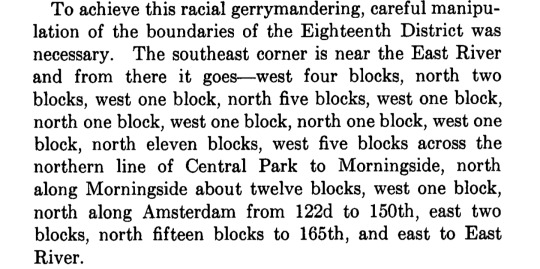
But the real joy comes in hearing two guys get really animated about New York district lines for the better part of two hours.
I’m sure it would make sense if I knew Manhattan.
6 notes
·
View notes
Text
New York City has been the backdrop for many TV series over the years, from “Law & Order” to “Sex and the City” to “Succession.” But the Showtime series “Billions,” which ends on Sunday after seven seasons, may have been the New Yorkiest of them all.
It’s clear from the opening credits, which feature an eagle-eye’s view of Lower Manhattan — but no actors — that New York City is not merely a location but the star.
The showrunners, Brian Koppelman and David Levien, planned it that way.
“The city plays a central role on the show,” said Mr. Levien. “We always felt like being here and knowing the city was like our secret weapon.”
Mr. Koppelman and Mr. Levien were both born on Long Island but eventually moved to New York City. (“Nothing makes you more desperate to be in Manhattan than growing up on Long Island,” Mr. Koppelman said.)
The two first worked together on the screenplay for the 1997 film “Rounders,” set in the underground poker scene in New York, and they went on to collaborate on “Knockaround Guys,” “Runaway Jury,” “Solitary Man” and “Ocean’s Thirteen.”
But “Billions” was their love letter to New York City.
New York has been integral to the plot, which follows the endless battle between hedge fund billionaires (Bobby “Axe” Axelrod, played by Damian Lewis, and in later seasons, Mike Prince, played by Corey Stoll) and the U.S. attorney, Chuck Rhoades Jr. (played by Paul Giamatti).
The characters have visited hundreds of locations in the city, from the Thurgood Marshall United States Court House on Centre Street in Lower Manhattan to Morningside Castle in Morningside Heights and the Brooklyn Heights Promenade. Scenes have been filmed at MetLife Stadium in the Meadowlands, Barclays Center in Brooklyn, and Yonkers Raceway.
“There was almost nowhere that we couldn’t shoot, that we wanted to,” Mr. Levien said.
The neighborhoods where the “Billions” characters live also serve as shorthand for their personalities.
Chuck’s father, Chuck Rhoades Sr., is an old school, blue-blood businessman, so naturally he lives on the wealthiest stretch of Fifth Avenue in Manhattan, not far from the Metropolitan Museum of Art.
Chuck Jr., whose positions as the U.S. attorney for the Southern District of New York (and New York attorney general) involve prosecuting financial crimes, lives in a Brooklyn brownstone (the exterior shots are of 49 Eighth Avenue, in Park Slope).
“Chuck Sr. would not experiment with another neighborhood just because he could, financially,” said Mr. Koppelman. “He’s not going to go try a loft in TriBeCa.”
And it makes sense that Chuck Jr. lives on an understated (but gorgeous) block outside Manhattan: “Chuck would have been a little bit rebellious to his dad’s ways,” Mr. Koppelman said. Brooklyn? “Senior thinks it’s like the frontier, basically.”
Axe, the character played by Damian Lewis, is the CEO of Axe Capital, a multibillion-dollar hedge fund. His Manhattan home is an airy, light-filled penthouse, high above the city. “It’s this incredible glass box built on top of this building downtown in TriBeCa,” said Mr. Levien. “Because, you know, he is somebody that would go try some neighborhood, live where he wants, open himself up to new experiences.”
The location was an actual apartment where the show filmed for a couple of years — and it impressed even the showrunners. “If you’re a New Yorker, it’s fascinating to walk through what a $60 million apartment is,” Mr. Koppelman said.
As die-hard denizens of New York City, the characters on “Billions” eat at all the best and most famous restaurants. There are scenes set inside upscale white-tablecloth rooms at expensive eateries like Keens Steakhouse, Babbo, Craft, Ai Fiori, Wolfgang’s Steakhouse, Michael’s, The Pool and Marea.
But the characters also visit more humble spots: Wo Hop, Gray’s Papaya, Joe’s Pizza, Old Town Bar, Costello’s Claddagh Inn.
There are new favorites (Una Pizza Napoletana) as well as New York classics, like Peter Luger’s, Cibao, Second Avenue Deli and Barney Greengrass.
Mr. Koppelman said that for New Yorkers, food information is a valuable currency. “Finding the best bao is as important as finding the best four-star flambé or something,” he laughed. “The show was absolutely trying to show you the real thing over and over again each time. Where’s the best hot dog, where’s the best burger?”
New York City chefs — including Daniel Boulud, David Chang, Kwame Onwuachi, Tom Colicchio, Alex Guarnaschelli — have made cameo appearances in “Billions,” weaving the show intricately into the food scene. (The show featured so many restaurants that someone wrote a book detailing the locations.)
“Because we’re New Yorkers and we care about New York, we care about these restaurants, we care about these people, we want to find a way to showcase what they love about their place and what they do,” said Mr. Koppelman.
(And at some restaurants, it’s not just the food that the characters are into: In the first episode of Season 4, Chuck Jr. and the police commissioner visit Sparks Steakhouse and re-enact the 1985 murder of Paul Castellano, the reputed boss of the Gambino crime family — a hit that an F.B.I. investigator said was arranged by John Gotti.)
In addition to celebrated places, the show features the occasional lesser-known gem — like Chartwell, “the world’s Only Winston Churchill bookstore.” When he needs some quick cash, Chuck Jr. sells his collection of Winston Churchill books.
Being featured on a television show can be a boost for business and for a shop owner’s self-esteem. “Most places that we got feedback from that were featured in the show were extremely happy to be associated and to be recognized sort of like nationally and internationally,” said Mr. Levien.
Watching movies set in New York when they were younger inspired both of the showrunners. The Coney Island scenes in “Warriors” and the dinner scene in “The Godfather,” they said, were especially memorable.
“The walking in the back door at the Copa in ‘Goodfellas’ is an all-time classic,” Mr. Levien said.
Mr. Koppelman was in awe of the Sal’s Pizza scenes in “Do the Right Thing.”
“I’ll never forget the extra cheese argument in that movie. It reveals so much about character,” he said. “It’s a very important thing in my cinematic journey as a young person wanting to do this — we thought over and over and over and over and over again about Sal’s Pizza.”
There was only one downside of filming in New York, Mr. Levien said: “Sirens and car horns. Ruining takes. When these actors are locked in concentrating on some serious emotional monologue or moment — and you know, it’s like, ‘Hold for the police helicopter. Hold for the fire truck.’”
For their next show, Mr. Levien and Mr. Koppelman may head to Florida. “We’re certainly really animated by the idea of making a show set in Miami,” Mr. Koppelman said.
Still, Mr. Levien said filming in New York was “such a privilege.”
Mr. Koppelman put it this way: “I do think, as is often the case for a Long Island-born New Yorker, who has been a New Yorker for 35 years, Billy Joel put it best: I’ve loved these days.”
#the last line made me tear up i won't lie#billions#brian koppelman#david levien#set posting#chuck rhoades#chuck rhoades senior#bobby axelrod#must admit i'm really enjoying the mental images of sirens and car horns interrupting takes
3 notes
·
View notes
